democracynow.org
Stories:

Exclusive: Source Reveals How Pentagon Ruined Whistleblower's Life and Set Stage for Snowden's Leaks
In a Democracy Now! broadcast exclusive, we speak with a former senior Pentagon official about how his superiors broke the law to punish a key National Security Agency whistleblower for leaking information about waste, mismanagement and surveillance. His account sheds light on how and why Edward Snowden revealed how the government was spying on hundreds of millions of people around the world. John Crane worked 25 years for the Department of Defense Office of Inspector General, which helps federal employees expose abuse. He now says whistleblowers have little choice but to go outside the system, and is speaking out about what happened to NSA whistleblower Thomas Drake, who revealed the existence of a widespread illegal program of domestic surveillance. Crane describes how in December 2010 Drake’s lawyers filed a complaint with the inspector general alleging he had been punished in retaliation for his whistleblowing, and that the crimes Drake was later charged with were "based in part, or entirely," on information he provided to the Pentagon inspector general. Mark Hertsgaard recounts Crane’s story in his new book, "Bravehearts: Whistle-Blowing in the Age of Snowden," and shows how Drake’s persecution sent an unmistakable message to Edward Snowden: Raising concerns within the system meant he would be targeted next. Edward Snowden has responded to Crane’s revelations by calling for a complete overhaul of U.S. whistleblower protections. "To me, the main issue is: Can we have a workable system that lets whistleblowers follow their own principled dissent without having them destroyed in the process?" asks John Crane. We are also joined by Mark Hertsgaard.
TRANSCRIPT
This is a rush transcript. Copy may not be in its final form.
AMY GOODMAN: Today, a Democracy Now! broadcast exclusive: A former senior Pentagon official speaks out for the first time about how his superiors broke the law to punish a key National Security Agency whistleblower. By now, everyone knows how Edward Snowden revealed the government spying on hundreds of millions of people around the world. But if you want to know why Snowden did it, and the way he did it, you need to know the story of John Crane, who worked 25 years for the Department of Defense Inspector General’s Office, which helps federal employees expose abuse and corruption. He now says whistleblowers have little choice but to go outside the system.
Crane is coming forward to speak about what happened to NSA whistleblower Thomas Drake, who revealed the existence of a widespread illegal program of domestic surveillance. Drake’s house was raided by the FBI in 2007. He was charged in 2010 under the Espionage Act. In 2011, he pled guilty to a minor misdemeanor of unauthorized use of a government computer. He did not serve jail time.
John Crane and Edward Snowden’s stories are told in the new book, Bravehearts: Whistle-Blowing in the Age of Snowden. In dozens of hours of interviews with reporter Mark Hertsgaard, Crane described how in December 2010 Drake’s lawyers filed a complaint with the inspector general alleging he had been punished in retaliation for his whistleblowing, and that the crimes Drake had been charged with were, quote, "based in part, or entirely," unquote, on information that Drake provided to the Pentagon inspector general during its investigation of the NSA whistleblowers. In other words, the indictment had unmistakable similarities to the confidential testimony Drake had given to Crane’s staff at the Pentagon’s Inspector General’s office. This suggests investigators had not simply given Drake’s name to the FBI, but shared his entire testimony.
Mark Hertsgaard recounts this and much more of Crane’s story publicly in his book, Bravehearts. In it, Hertsgaard tells how Drake’s arrest, indictment and persecution sent an unmistakable message to Snowden: Raising concerns within the system meant he would be targeted next. Edward Snowden has responded to Crane’s revelations by calling for a complete overhaul of the U.S. whistleblower protections. Snowden told The Guardian, quote, "We need iron-clad, enforceable protections for whistleblowers, and we need a public record of success stories. Protect the people who go to members of Congress with oversight roles, and if their efforts lead to a positive change in policy—recognize them for their efforts. There are no incentives for people to stand up against an agency on the wrong side of the law today, and that’s got to change," Snowden said. He continued, "The sad reality of today’s policies is that going to the inspector general with evidence of truly serious wrongdoing is often a mistake. Going to the press involves serious risks, but at least you’ve got a chance," he says.
Well, for more, we’re joined here for the first time by John Crane, formerly with the Department of Defense Inspector General’s Office, which helps federal employees expose abuse and corruption. And we’re joined by Mark Hertsgaard, who is the correspondent at Nation magazine, author of the newly published book, Bravehearts: Whistle-Blowing in the Age of Snowden.
We welcome you both to Democracy Now!
JOHN CRANE: Thank you.
AMY GOODMAN: So, John Crane, talk about why you are coming out publicly for the first time.
JOHN CRANE: I’m coming out publicly for the first time because what Edward Snowden did is it was the largest, most massive classified leak in this country’s history. And so we have two separate issues here, that one is we, I think, need to make sure that there won’t be any more massive disclosures like that, but we can only assure that, should we have a whistleblower protection system in place that will make sure, one, whistleblowers have the confidence to step forward without having their own individual identities compromised, and when they step forward, that they’re not subject to multiyear retaliation.
AMY GOODMAN: Talk about where you worked—people may not even realize the Pentagon has an Inspector General’s Office—and what you were in charge of.
JOHN CRANE: Yes. I was with the Inspector General’s Office. I worked there for 25 years. I was a senior executive there. I was one of the founding generations there. I had an office that was largely responsible for transparency and for accountability. Transparency meant that I dealt with the media, Congress. Accountability meant that I was responsible for the overall whistleblowing process. DOD is a huge agency. We have 1.2 million military. We have almost 700,000 civilians. We have half of the federal workforce. I was charged to make sure that within the Pentagon, that there could be principled dissent that would help to inform senior management regarding the way senior management made their own decisions, and—and that that system guaranteed that those people stepping forward would not be destroyed.
AMY GOODMAN: And that included, you oversaw the NSA, as well.
JOHN CRANE: Yes.
AMY GOODMAN: So when did you start to get nervous? When did you start to get alarmed?
JOHN CRANE: I got alarmed fairly early on, because since I was responsible for working with the Hill, when we received the first whistleblowing complaints, the so-called four plus one—Drake was called "plus one" because he wanted to have confidentiality maintained—that I then went up to the House and Senate Intel Committees, and they were making complaints about a large multibillion-dollar program that was responsible to gather huge amounts of information from U.S. citizens also. And it was simply behind schedule, over cost. It wasn’t meeting acquisition milestones. So we, of course, met with the Congress, and then we started a 18-month audit effort to see whether or not the various allegations brought to us were actually valid, that we found that most of their concerns were valid, and then we had the audit report issued in December of 2004.
One of the very important points of that audit report was—was that this is our audit report, IG DOD audit report, talked about a climate within the NSA regarding management reprisal. As the inspector general DOD, by statute, it is our responsibility making sure management reprisal does not take place. When I saw that, I said, "Look, we now have a civilian reprisal investigator on staff, Daniel Meyer, and he is now the whistleblower ombudsman for the larger intelligence community." And I wanted him to have the matter investigated, because we had made a finding. And I was subsequently told that we could not have the matter investigated, and that was the first warning flag to me that there was a problem.
AMY GOODMAN: So, I want to go to National Security Agency whistleblower Thomas Drake in his own words. He was initially charged under the Espionage Act for leaking information about waste management at the agency, but the case against him later collapsed. We talked to Thomas Drake in 2012 about his case.
THOMAS DRAKE: I was charged under the Espionage Act as part of an indictment that was handed down on me in April of 2010. There was five counts under the Espionage Act for retaining—not leaking, retaining—national defense information, although the government alleged that I was doing so for the purpose of disclosure to those unauthorized to receive it. I was also charged with obstruction of justice, as well as making false statements to FBI agents. ...
My first day on the job was 9/11. And it was shortly after 9/11 that I was exposed to the Pandora’s box of illegality and government wrongdoing on a very significant scale. So, you had the twin fraud, waste—you know, the twin specters of fraud, waste and abuse being committed on a vast scale through a program called Trailblazer, a multibillion-dollar program, when in fact there was alternatives that already existed and fulfilled most all the requirements of Trailblazer, even prior to 9/11.
AMY GOODMAN: What happened to both Thomas Drake and Bill Binney and other NSA officials was frightening. We had a chance in April of 2012 to interview NSA whistleblower William Binney. He was appearing on Democracy Now! in his first-ever television interview, and he described what happened when FBI agents raided his home after he became a whistleblower. This was right before they raided Tom Drake’s house, but this was Bill Binney’s description of what happened to him.
WILLIAM BINNEY: I live in Maryland, actually four miles from NSA.
AMY GOODMAN: And what happened?
WILLIAM BINNEY: They came busting in.
AMY GOODMAN: Who’s "they"?
WILLIAM BINNEY: The FBI. About 12 of them, I think, 10 to 12. They came in with the guns drawn, on my house.
AMY GOODMAN: Where were you?
WILLIAM BINNEY: I was in the shower. I was taking a shower, so my son answered the door. And they of course pushed him out of the way at gunpoint and came running upstairs and found me in the shower, and came in and pointed the gun at me while I was, you know—
AMY GOODMAN: Pointed a gun at your head?
WILLIAM BINNEY: Oh, yeah. Yes. Wanted to make sure I saw it and that I was duly intimidated, I guess.
JUAN GONZÁLEZ: And what did they—what did they do at that point? Did they begin questioning you? Or they just took you to headquarters? Or—
WILLIAM BINNEY: No, no. Yeah, they basically separated us from—I was separated from my family. Took me on the back porch, and they started asking me questions about it. They were basically wanting me to tell them something that would implicate someone in a crime. And so, I told them that I didn’t really know—they wanted to know about certain people, that was—they were the ones that were being raided at the same time, people who—we all signed—those who were raided that day, all of us signed the DOD IG complaint. We were the ones who filed that complaint.
AMY GOODMAN: The Pentagon—
WILLIAM BINNEY: The Pentagon DOD IG, against—
AMY GOODMAN: —inspector general complaint.
WILLIAM BINNEY: Against NSA, yes, talking about fraud—basically corruption, fraud, waste and abuse. And then—
AMY GOODMAN: Tom Drake was raided at the same time?
WILLIAM BINNEY: No, he was raided in November of that year. We were just the ones who signed it, were raided.
JUAN GONZÁLEZ: So, and who were the other people that were raided that same day?
WILLIAM BINNEY: Diane Roark, Kirk Wiebe and Ed Loomis.
AMY GOODMAN: Diane Roark worked for the Senate committee?
WILLIAM BINNEY: Diane was the senior staffer. She had the NSA account on the HPSCI side, on the House side.
AMY GOODMAN: So, they were the four, and plus one was Drake. His house would be raided soon after. John Crane, if you could explain—Bill Binney ultimately would not be charged. Bill Binney, by the way, is a double amputee.
JOHN CRANE: Correct.
AMY GOODMAN: But Tom Drake was charged, and you noticed something very similar about the charges against him and what he revealed to your office.
JOHN CRANE: Yes. I was very concerned, because when there was a 10-count indictment returned, that three of the counts involved him housing information at his home. I was concerned that—well, first, he was a confidential whistleblower. And under the Inspector General Act of 1978, as amended, that their confidentialities are not revealed, and they can only be revealed under two separate circumstances, that, one, you have to ask the whistleblower whether they can have their identities revealed, and, two, only if there is no other alternative. This is a case where this was not a threat to health, safety—immediate threat. And my concern was—and this was actually raised through the Government Accountability Project, because they represented him—was that three of the charges could have related to whether or not he was following advice from the inspector general DOD. And I was concerned that should he have had housed material at his home, based upon IG DOD advice, he was then being on trial—put on trial under the Espionage Act because he was a confidential informant working with the IG, inspector general.
AMY GOODMAN: We’re going to break, but I have to ask: What happened to you when you started raising these concerns? You’re there supposed to be protecting whistleblowers—
JOHN CRANE: Right.
AMY GOODMAN: —in the Pentagon and the NSA.
JOHN CRANE: Right.
AMY GOODMAN: And you are now becoming a whistleblower.
JOHN CRANE: Right. I was shut down, that I was the IG DOD FOIA appellate authority also. And—
AMY GOODMAN: Meaning when people asked you, under the Freedom of Information Act, for information.
JOHN CRANE: Absolutely. So, when his attorneys came to us, they wanted to see whether—in the 2004 audit, that whether in those work papers that there was exculpatory information regarding why Drake acted the way he did. As the FOIA appellate authority, I was in charge of simply gathering all of the information in the agency, that—those are documents that should have been retained, that they should have been permanent record. Some of them were also secret documents, top-secret documents, sensitive intelligence documents. There’s a very strict protocol regarding how those are handled, where they are, and if and when they are destroyed, and, of course, by whom. Those were answers I could not receive, and that was highly unusual.
AMY GOODMAN: We’re going to continue this discussion in a moment. John Crane, former senior official at the Pentagon, has revealed major privacy and security lapses within the government’s whistleblower program. For a quarter of a century, he worked with the Department of Defense Inspector General’s Office, which is supposed to help federal employees expose abuse and corruption. This is a secret chapter that even Edward Snowden did not know about but is now coming to understand, what was happening within the government. And we’re going to speak with Mark Hertsgaard, as well, when we come back, to get a full picture of how this all fits together. His new book is out; it’s called Bravehearts: Whistle-Blowing in the Age of Snowden. Stay with us. ... Read More →
Headlines:Obama: Death of Taliban Leader in U.S. Drone Strike an "Important Milestone"
President Obama has confirmed a U.S. drone strike in Pakistan killed the leader of the Afghan Taliban. In a statement, Obama called the death of Mullah Akhtar Mohammad Mansour "an important milestone." Speaking earlier today in Hanoi as part of his visit to Vietnam, Obama denied the killing marked a shift in the U.S. role in Afghanistan.
President Barack Obama: "This does not represent a shift in our approach. We are not re-entering the day-to-day combat operations that are currently being conducted by Afghan security forces. Our job is to help Afghanistan secure in its own country, not to have our men and women in uniform engage in that fight for them."
TOPICS:
Obama
Afghanistan
Drone Attacks
Obama Ends Decades-Old Arms Ban on Vietnam
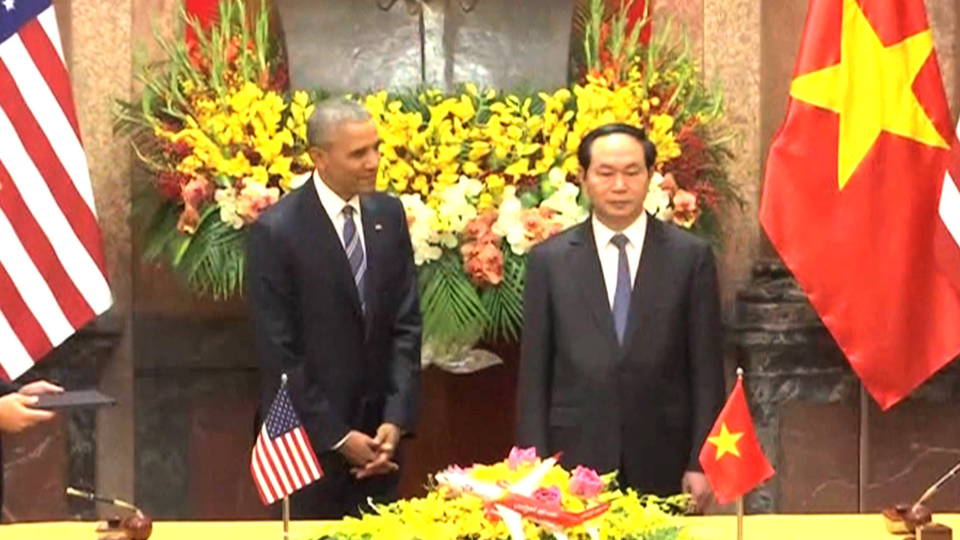
Prior to the war in Afghanistan, the Vietnam War was the longest war in U.S. history. As part of his visit to Vietnam, Obama announced the end of one of the last vestiges of the Vietnam War: a decades-old ban on the sale of lethal military equipment to Vietnam.
President Barack Obama: "I can also announce that the United States is fully lifting the ban on the sale of military equipment to Vietnam that has been in place for some 50 years. As with all our defense partners, sales will need to still meet strict requirements, including those related to human rights. But this change will ensure that Vietnam has access to the equipment it needs to defend itself, and removes a lingering vestige of the Cold War."
This Friday, Obama will visit the Japanese city of Hiroshima, becoming the first sitting U.S. president to visit the city where the U.S. dropped a nuclear bomb toward the end of World War II. Obama will not apologize for the nuclear bombing, which killed 140,000 people and seriously wounded another 100,000.
TOPICS:
Vietnam
Obama
Iraq Launches Bid to Retake Fallujah from ISIS

Iraqi Prime Minister Haider Al-Abadi has announced the launch of a major operation to retake the city of Fallujah from ISIS. Al Jazeera reports heavy shelling in the area has killed six civilians. Fallujah became the first Iraqi city conquered by ISIS in January 2014. A decade earlier, after the U.S. invasion of Iraq, the U.S. push to recapture Fallujah involved the extensive use of depleted uranium and white phosphorus, leaving a legacy of birth defects that continues today.
TOPICS:
Iraq
Islamic State
Syria: Explosions Kill Over 100 in Regime-Controlled Areas
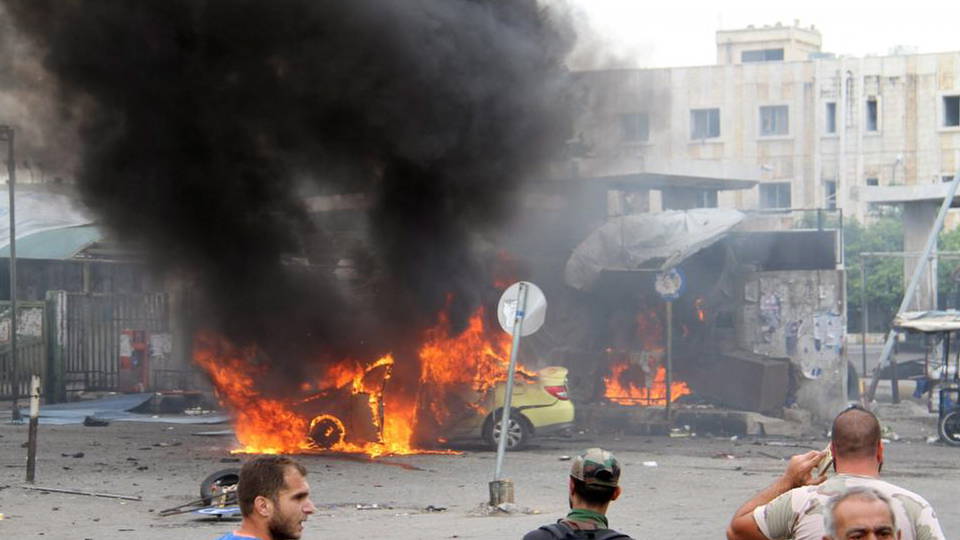
In Syria, a series of explosions have killed scores of people in areas controlled by the Syrian regime which also host Russian forces. ISIS has claimed responsibility for today’s attacks in the coastal cities of Jableh and Tartus. State media said at least 78 people were killed, while monitoring groups put the toll at more than 100.
TOPICS:
Syria
Islamic State
Sanders Criticizes "Anointment" of Clinton, Backs Opponent of DNC Chair
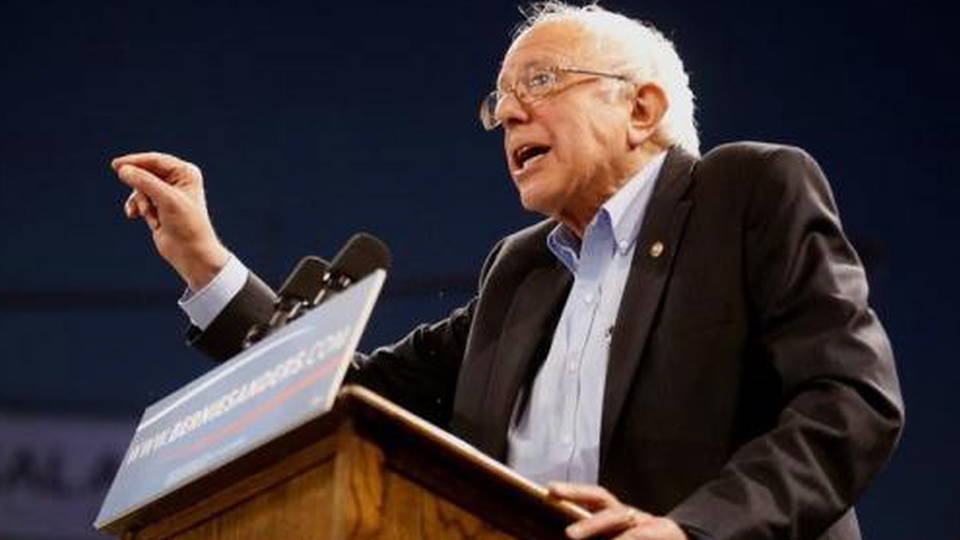
Here in the United States, tensions continue between Democratic presidential candidate Bernie Sanders and the party establishment. Sanders has announced his support for Tim Canova, who is challenging the Florida congressional seat of Democratic National Committee Chair Debbie Wasserman Schultz. In a CNNinterview with Jake Tapper, Sanders also criticized the superdelegate system that he said "anointed" Hillary Clinton as the nominee.
Sen. Bernie Sanders: "The point that I was making is there’s something absurd when I get 46 percent of the delegates that come from real contests, real elections, and 7 percent of the superdelegates. And the point that I made a few minutes after that is that some 400 of Hillary Clinton’s superdelegates came on board her campaign before anybody else announced."
Jake Tapper: "Absolutely true."
Sen. Bernie Sanders: "It was an anointment."
Jake Tapper: "Yeah"
Sen. Bernie Sanders: "OK. And that is bad for the process."
TOPICS:
Bernie Sanders
Hillary Clinton
2016 Election
Democratic Party
Austria: Far-Right Candidate Narrowly Loses Presidential Race
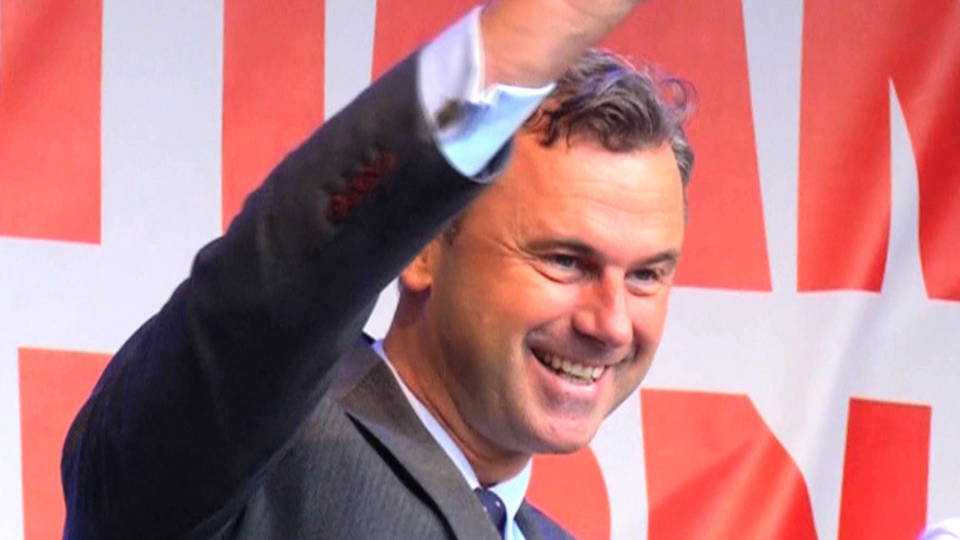
Update: BBC News reports Green Party-backed candidate Alexander Van der Bellen has won the election, defeating the far-right candidate, Norbert Hofer.
In Austria, a far-right candidate has deadlocked with a Green Party-backed candidate in the presidential election. The close race will decided by mail-in ballots. Norbert Hofer of the far-right Freedom Party has campaigned on an anti-migrant platform focused on the arrival of refugees. Far-right parties have seen a surge across the continent, but Hofer would be the first far-right head of state elected in Europe since 1945.
"March Against Monsanto" Brings Protesters to Streets in 400 Cities

People took to the streets in more than 400 cities on six continents Saturday for a global action against the agribusiness giant Monsanto. Here in New York City, about 100 people marched against Monsanto’s use of the herbicide glyphosate, which some studies have shown may cause cancer.
Athena Manolopoulos: "My name is Athena, and I’m here at this protest because I think Monsanto is a terrible company in so many ways. It hurts the planet. It hurts animals. It hurts people. It hurts our bodies. And they really just only care about profit and having global control over our food supply. And they’re not open-minded about having their food labeled or tested properly. And they certainly don’t care about the people who are eating it, and they certainly don’t care about their farmers, who are being debt-trapped and committing suicide on a daily basis."
In Mexico, demonstrators said they did not want Monsanto’s genetically modified seeds to take root in the country because they threaten native crops.
Urbano Silvestre: "They (Monsanto) want every grain of corn in the world to have some of their chemical products. Why? So every time someone wants to sow corn, they have to ask permission and pay Monsanto to do it. And each time someone sells corn, they have to pay a commission to them."
Adelita San Vicente: "We believe that in Mexico, as the origin point of corn, the most important grain for humanity today, the sowing of Monsanto seeds should not be allowed at any point. We are the genetic reservoir of this grain, which is capable of resisting climate change and, after oil, is the most widely used product. And that status of Mexico as the origin point of corn should be preserved."
TOPICS:
Mexico
Monsanto
WMO Calls for Climate Action After Another Heat Record "Smashed"
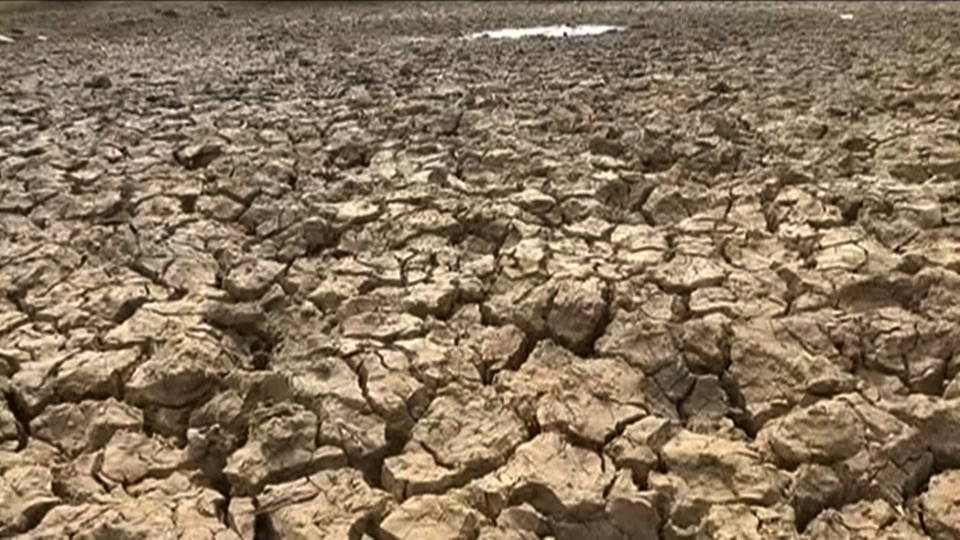
The World Meteorological Organization has called for all states to ratify and implement the Paris climate accords as high temperatures continue to smash global records. Spokesperson Clare Nullis said urgent action is needed after April broke yet another record.
Clare Nullis: "Another month, another global temperature record has been set. So, surprise, surprise, April set new records for record high temperatures both on land and the ocean. This is the 12th straight month that we’ve seen temperatures records broken. What’s particularly concerning is the margin at which these records are being broken. They’re not being broken; they’re being smashed, and on a fairly consistent basis."
TOPICS:
Climate Change
Global Warming
Bangladesh: Cyclone Kills 24, Forces Half a Million to Flee
Last Thursday marked India’s hottest day ever, as temperatures soared to 124 degrees Fahrenheit. Meanwhile in Bangladesh, a cyclone has slammed coastal areas, forcing half a million people to flee and killing at least 24. Scientists have warned such storms may be amplified by climate change.
TOPICS:
Bangladesh
Climate Change
Global Warming
New York: 21 Arrested Blocking Pipeline in Peekskill
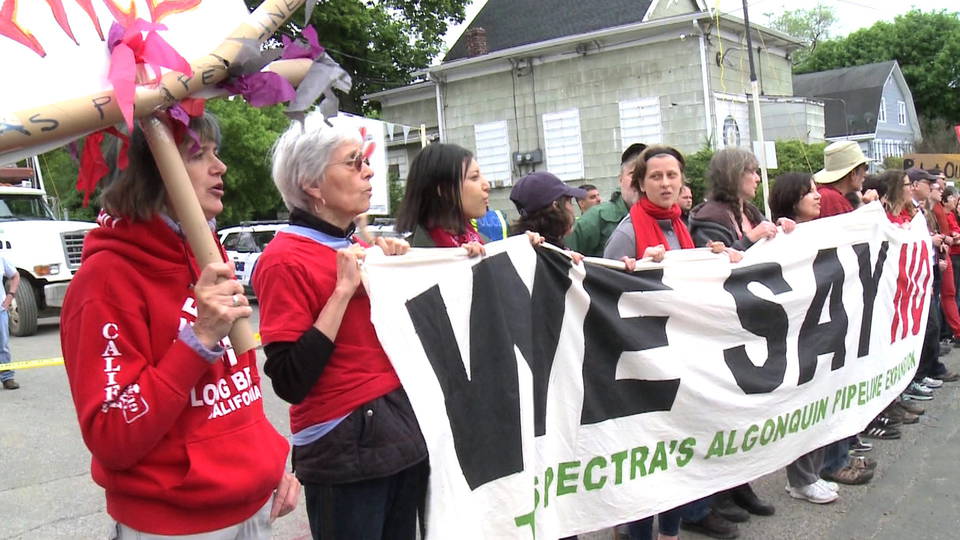
Meanwhile, activists in Peekskill, New York, have staged the latest act of civil disobedience against the fossil fuel industry, which is the leading cause of climate change. Twenty-one people were arrested after forming a human chain to block construction of a pipeline that would carry high-pressure methane gas through residential communities near the Indian Point nuclear plant. Benjamin Shepard spoke shortly before he was arrested.
Benjamin Shepard: "We’re here to ask: If all of our elected representatives are on record as being against this pipeline, if the mayor of Peekskill is on record as being against the pipeline, if the people of Peekskill are on record as being against this pipeline, who’s calling the shots? The people or the corporations? And if the corporations won’t get out of the way, the people have to do it, are going to have to get in their way. And that’s why we’re here, to stop the machinery."
TOPICS:
Pipeline
Climate Change
Global Warming
Guantánamo Prisoner Obaidullah Cleared for Release After 14 Years
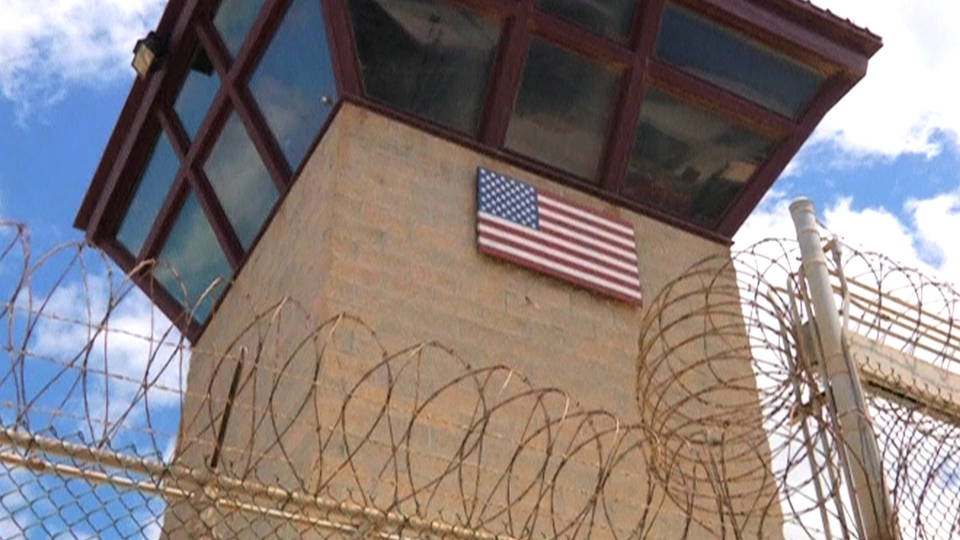
A Guantánamo prisoner held for 14 years without criminal trial has been cleared for release. U.S. forces captured the prisoner, known as Obaidullah, during a raid in Afghanistan in 2002 when he was 19. He was accused of planting bombs in a field near his home, although his attorneys said the bombs were relics of the war against the Soviet invasion of Afghanistan which his family had buried in order to dispose of them. The Obama administration dismissed the charges against him in 2011, but he remained in prison. He has alleged torture during interrogation and was one of the prisoners who launched a hunger strike in 2013; news reports at the time said he had lost 36 pounds. Despite Obama’s pledge to close Guantánamo, there are now 80 prisoners there, 28 of them cleared to leave.
TOPICS:
Afghanistan
Guantanamo
Oklahoma Governor Vetoes Bill to Make Abortion a Felony
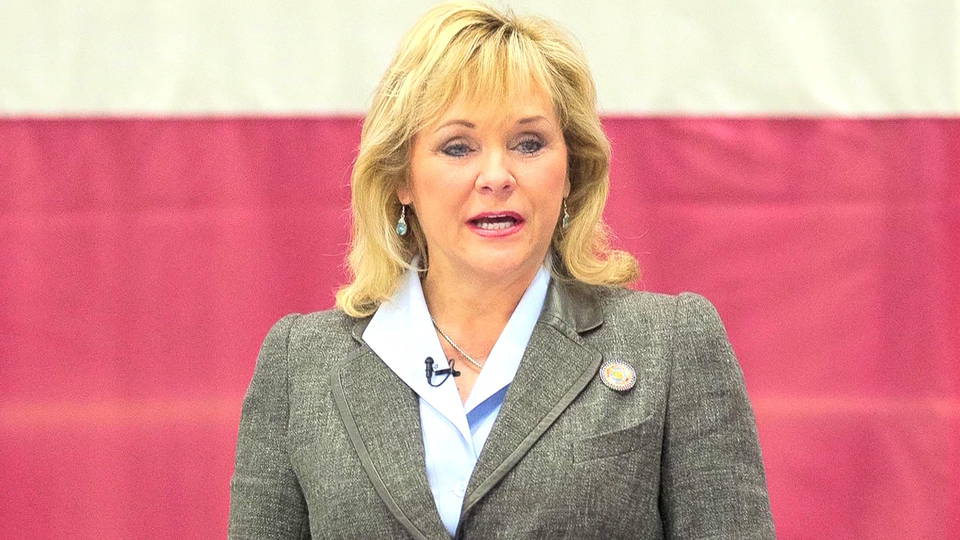
Oklahoma Governor Mary Fallin has vetoed an unprecedented bill to make performing an abortion a felony punishable by up to three years in prison. Fallin, who has a long history of supporting anti-choice measures, vetoed the measure on a technicality, saying the language surrounding an exception to save the life of the pregnant person was too vague. The bill’s sponsor, Republican state Senator Nathan Dahm, has said he may try to override the governor’s veto.
TOPICS:
Abortion
New York: Farmworkers Walking 200 Miles to Demand Labor Protections
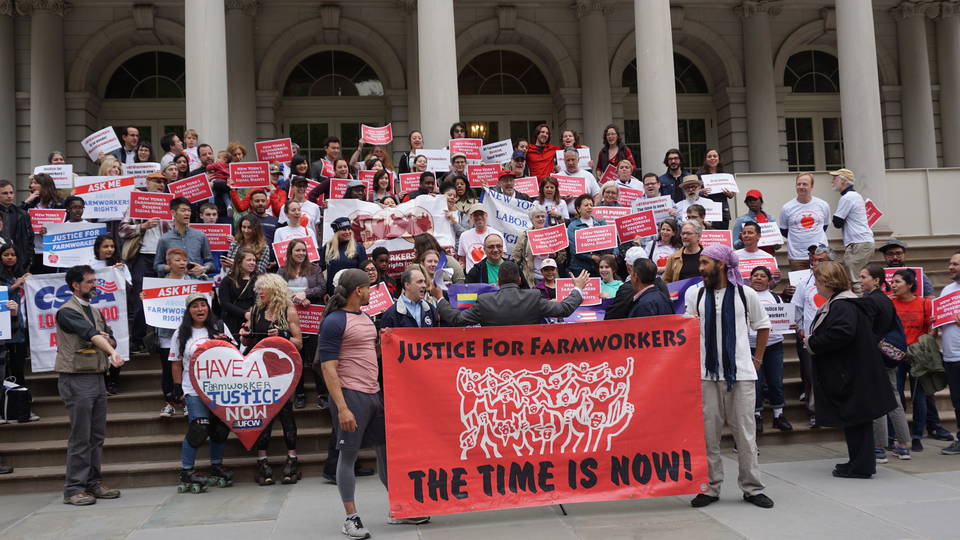
And here in New York, farmworkers have passed through New York City as part of a 200-mile-long march to demand equal protection under labor laws. They say farmworkers face long hours and harsh working conditions but are exempt from many state and federal labor protections. The farmworkers are marching from Smithtown, Long Island, to the New York capital, Albany, upstate, to demand overtime pay, an optional day of rest each week and the right to bargain collectively. Heriberto González spoke outside City Hall in New York City.
Heriberto González: "I would like to say, each time you are eating, or each time you have something in your hands that you are going to eat, remember us, who do not have the rights that other workers have. And if you can, support us. We are going to be marching for another week and a few days. If you see us, it would be good if you support us by walking with us, maybe a couple of hours, one hour, for a day if you can. That would be very good."
TOPICS:
Agriculture
Labor
U.S. Labor Protests
Donate today:
Follow:




SPEAKING EVENTS

5/24 Brooklyn, NY
6/11 Chicago, IL
6/25 New York, NY
7/29 Provincetown, MA
7/30 Martha's Vineyard, MA
more
NEW BOOK

Chomsky: Today's GOP is a Candidate for Most Dangerous Organization in Human History—Part 2
207 West 25th Street, 11th Floor
New York, New York 10001, United States
---------------------
---------------------

No comments:
Post a Comment